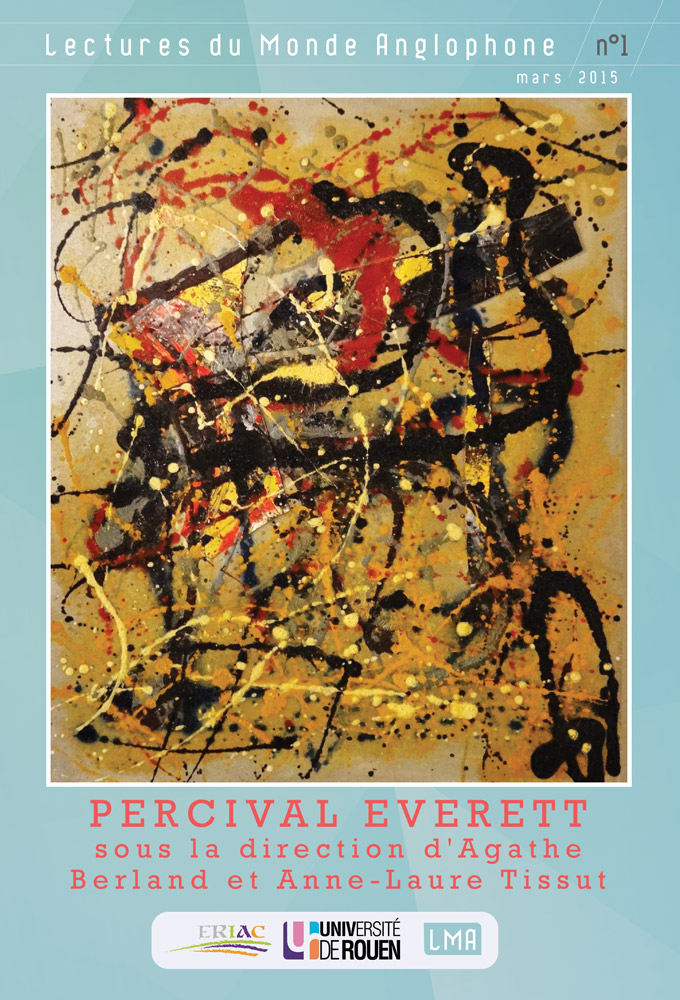Sommaire
1 | 2015
Percival Everett
Ce volume recueille les communications présentées lors du colloque international « Percival Everett » organisé par l’équipe, à l’initiative d’Agathe Berland et d’Anne-Laure Tissut, en mars 2013 à la Maison de l’Université de Mont-Saint-Aignan.Textes recueillis par Agathe Berland et Anne-Laure Tissut, et mis en forme par Sarah Boulet. This volume gathers the papers given at the international conference “Percival Everett” organised by the ERIAC research center and managed by Agathe Berland and Anne-Laure Tissut, that took place in March 2013 at the Maison de l’Université in Mont-Saint-Aignan.Texts collected by Agathe Berland and Anne-Laure Tissut, and finalized for publication by Sarah Boulet.

- Anne-Laure Tissut Introduction
- Keith B. Mitchell Encountering the Face of the Other: Levinasian Ethics and Its Limits in Percival Everett’s God’s Country
- Marguerite Déon Clichés and cultural icons in Percival Everett’s fiction
- Anthony Stewart Talking About Race, Exposing The Desire for the Post-Racial, and Percival Everett’s Assumption
- Claude Julien Assumption: from reminiscences to surprise, from dream to nightmare
- Isabelle Van Peteghem-Tréard Jouissance in Damnedifido stories by Percival Everett
- Clément-Alexandre Ulff Invisible Fathers: Investigating Percival Everett’s “Lower Fresquencies”
- Michel Feith The Well-Tempered Anachronism, Or The C(o)urse of Empire in Percival Everett’s For Her Dark Skin
- Judith Roof Everett’s Eidolon: The Story of an Eye
- Brigitte Félix “Of weeds and words: Percival Everett’s poetry”
- Claudine Raynaud Naming, Not Naming and Nonsense in I am Not Sidney Poitier
- Françoise Sammarcelli Vision and Revision in Percival Everett’s Erasure
- Marie-Agnès Gay "Wanted: straight words" in Percival Everett’s novel Wounded
- Sylvie Bauer “Private Terbulent Seas”: “painting The Moon” In Cutting Lisa, By Percival Everett
- Gwen Le Cor “At any rake,” angles of “linguistic condensation” and shock in Percival Everett’s The Water Cure: “All this while we play and pain with a language that is private.”
1 | 2015
Talking About Race, Exposing The Desire for the Post-Racial, and Percival Everett’s Assumption
Anthony Stewart
A reviewer of Percival Everett’s 2011 novel, Assumption, recently stated that “in the second section [of the novel] — about a drug heist gone wrong that contains such mystery-novel archetypes as a one-armed villain and a daring escape from a moving van — Ogden’s race is never mentioned as he investigates the crime; race is treated as irrelevant to his character.” Ogden Walker, the novel’s protagonist, is black in the second section of Assumption, as he is in the first and third sections of the novel. The reviewer, however, makes the remarkable suggestion that race is irrelevant unless it is mentioned, and, moreover, that it must continue to be mentioned or else it will be rendered irrelevant. This is the kind of crucial error that is actively invited by Everett’s work. The reviewer assumes that Everett sees race in the simplistic way that the reviewer does, and that the Everett sees his readership as bluntly as the reviewer assumes them to be. Instead, Assumption may most productively be read as issuing the sort of challenge that Everett has been laying down to his readers since his first novel, Suder, was published in 1983. The challenge is to approach issues of race along with, rather than instead of, the other large questions encountered in serious fiction. This challenge is all-the-more significant with the rise of the notion of the “post-racial” in American public discourse. Everett’s novel and Barthes’s theorizing of the notion of mythology enable a critique of the post-racial and argue for an understanding of the instructive and critical challenges to the post-racial posed by Everett’s work.
Ce texte n’a pas encore fait l’objet d’une rétroconversion en XML, mais il peut être consulté dans sa version PDF.

Ce(tte) œuvre est mise à disposition selon les termes de la Licence Creative Commons Attribution - Pas dUtilisation Commerciale - Partage dans les Mêmes Conditions 4.0 International. Polygraphiques - Collection numérique de l'ERIAC EA 4705
URL : http://publis-shs.univ-rouen.fr/eriac/index.php?id=513.
Quelques mots à propos de : Anthony Stewart
Bucknell University
Anthony Stewart is a Professor of English at Bucknell University. His main research interest is twentieth-century African American Literature and Culture. He also teaches twentieth-century British Literature and is the author of two books: George Orwell, Doubleness, and the Value of Decency (Routledge, 2003), and You Must Be a Basketball Player: Rethinking Integration in the University (Fernwood, 2009). Stewart has published essays on Ralph Ellison, Percival Everett, August Wilson, and on representations of the African American male athlete, and is currently working on a book on privilege, tentatively titled Notes From a Visitor: On Privilege and Belonging (under contract with Fernwood Publishing), and a critical book on the work of Percival Everett, tentatively entitled Approximate Gestures: The Meaning of the Between in the Fiction of Percival Everett (under contract with Louisiana State University Press).
